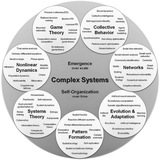🗞 #Physics, #Emergence, and the #Connectome
Robert B. Laugh
Department of Physics, Stanford University, Stanford, CA
🔗 http://www.cell.com/neuron/pdf/S0896-6273(14)00681-3.pdf
📌 SUMMARY:
Experience with complex systems more primitive than the brain teaches important lessons about big data in biology. Chief among them is that physical laws, relationships among measured things that are always true, emerge out of chaos, not the other way around. Correct prediction (as opposed to incorrect prediction) from large data sets requires understanding of these laws. The reason is that the same processes that make them also make the system wildly error-intolerant if the errors are too large. This instability routinely causes computer simulations of even primitive systems to fail by enabling mistakes to cascade into ever worsening falsehoods. The more complex and sophisticated the system is, the more intolerant to errors it becomes.
Robert B. Laugh
Department of Physics, Stanford University, Stanford, CA
🔗 http://www.cell.com/neuron/pdf/S0896-6273(14)00681-3.pdf
📌 SUMMARY:
Experience with complex systems more primitive than the brain teaches important lessons about big data in biology. Chief among them is that physical laws, relationships among measured things that are always true, emerge out of chaos, not the other way around. Correct prediction (as opposed to incorrect prediction) from large data sets requires understanding of these laws. The reason is that the same processes that make them also make the system wildly error-intolerant if the errors are too large. This instability routinely causes computer simulations of even primitive systems to fail by enabling mistakes to cascade into ever worsening falsehoods. The more complex and sophisticated the system is, the more intolerant to errors it becomes.
